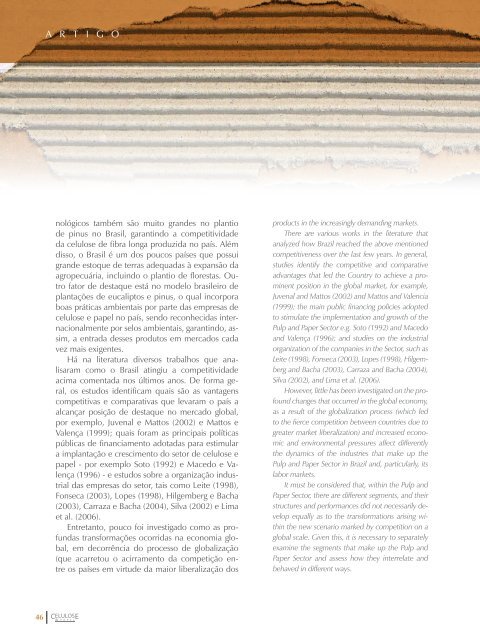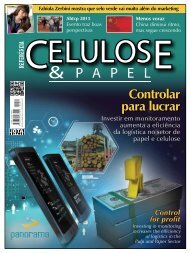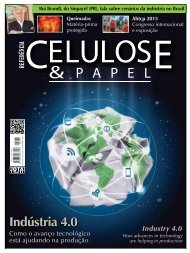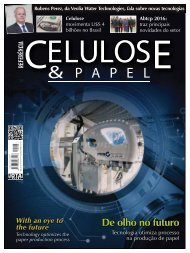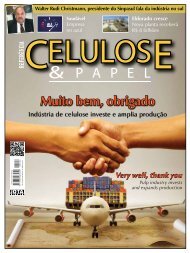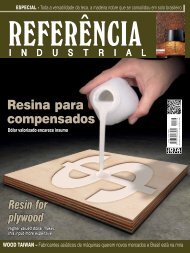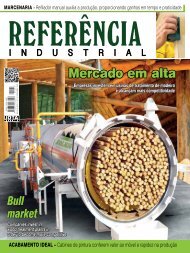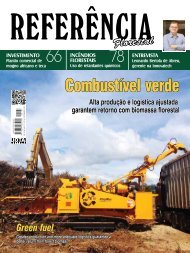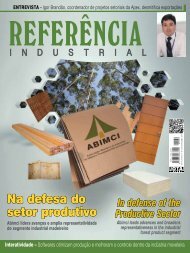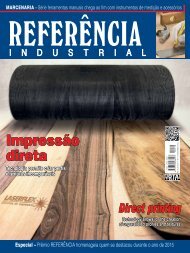Junho/2016 - Celulose e Papel 25
Visitantes - Grupo Jota Comunicação
Visitantes - Grupo Jota Comunicação
You also want an ePaper? Increase the reach of your titles
YUMPU automatically turns print PDFs into web optimized ePapers that Google loves.
A R T I G O<br />
nológicos também são muito grandes no plantio<br />
de pinus no Brasil, garantindo a competitividade<br />
da celulose de fibra longa produzida no país. Além<br />
disso, o Brasil é um dos poucos países que possui<br />
grande estoque de terras adequadas à expansão da<br />
agropecuária, incluindo o plantio de florestas. Outro<br />
fator de destaque está no modelo brasileiro de<br />
plantações de eucaliptos e pinus, o qual incorpora<br />
boas práticas ambientais por parte das empresas de<br />
celulose e papel no país, sendo reconhecidas internacionalmente<br />
por selos ambientais, garantindo, assim,<br />
a entrada desses produtos em mercados cada<br />
vez mais exigentes.<br />
Há na literatura diversos trabalhos que analisaram<br />
como o Brasil atingiu a competitividade<br />
acima comentada nos últimos anos. De forma geral,<br />
os estudos identificam quais são as vantagens<br />
competitivas e comparativas que levaram o país a<br />
alcançar posição de destaque no mercado global,<br />
por exemplo, Juvenal e Mattos (2002) e Mattos e<br />
Valença (1999); quais foram as principais políticas<br />
públicas de financiamento adotadas para estimular<br />
a implantação e crescimento do setor de celulose e<br />
papel - por exemplo Soto (1992) e Macedo e Valença<br />
(1996) - e estudos sobre a organização industrial<br />
das empresas do setor, tais como Leite (1998),<br />
Fonseca (2003), Lopes (1998), Hilgemberg e Bacha<br />
(2003), Carraza e Bacha (2004), Silva (2002) e Lima<br />
et al. (2006).<br />
Entretanto, pouco foi investigado como as profundas<br />
transformações ocorridas na economia global,<br />
em decorrência do processo de globalização<br />
(que acarretou o acirramento da competição entre<br />
os países em virtude da maior liberalização dos<br />
products in the increasingly demanding markets.<br />
There are various works in the literature that<br />
analyzed how Brazil reached the above mentioned<br />
competitiveness over the last few years. In general,<br />
studies identify the competitive and comparative<br />
advantages that led the Country to achieve a prominent<br />
position in the global market, for example,<br />
Juvenal and Mattos (2002) and Mattos and Valencia<br />
(1999); the main public financing policies adopted<br />
to stimulate the implementation and growth of the<br />
Pulp and Paper Sector e.g. Soto (1992) and Macedo<br />
and Valença (1996); and studies on the industrial<br />
organization of the companies in the Sector, such as<br />
Leite (1998), Fonseca (2003), Lopes (1998), Hilgemberg<br />
and Bacha (2003), Carraza and Bacha (2004),<br />
Silva (2002), and Lima et al. (2006).<br />
However, little has been investigated on the profound<br />
changes that occurred in the global economy,<br />
as a result of the globalization process (which led<br />
to the fierce competition between countries due to<br />
greater market liberalization) and increased economic<br />
and environmental pressures affect differently<br />
the dynamics of the industries that make up the<br />
Pulp and Paper Sector in Brazil and, particularly, its<br />
labor markets.<br />
It must be considered that, within the Pulp and<br />
Paper Sector, there are different segments, and their<br />
structures and performances did not necessarily develop<br />
equally as to the transformations arising within<br />
the new scenario marked by competition on a<br />
global scale. Given this, it is necessary to separately<br />
examine the segments that make up the Pulp and<br />
Paper Sector and assess how they interrelate and<br />
behaved in different ways.<br />
46


